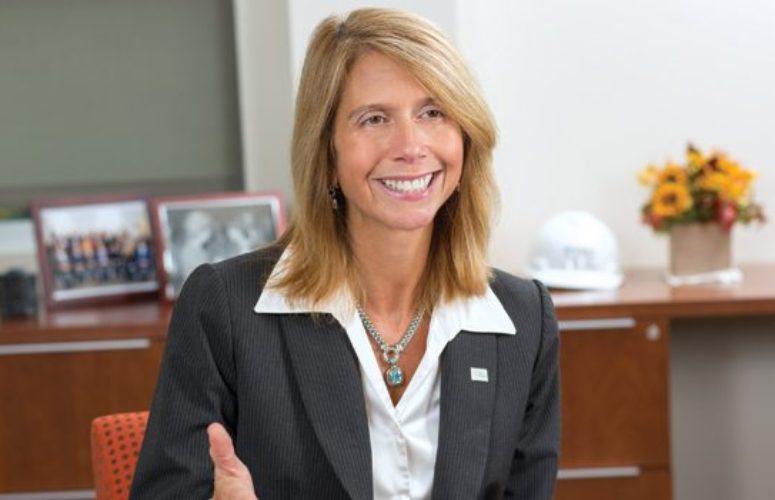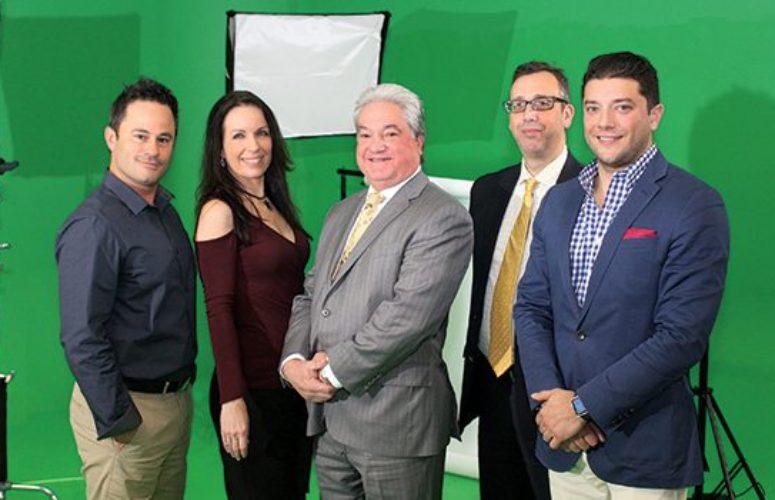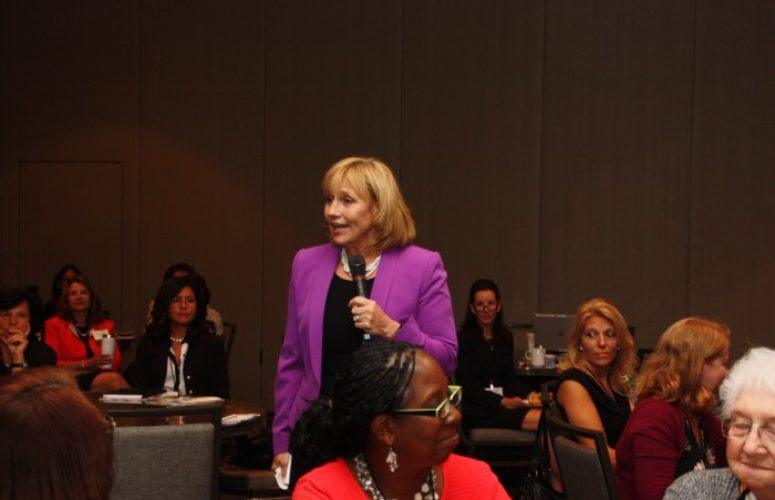
‘Taking an Organization from Great to Nirvana’
A sit-down Q&A with newly installed NJBIA president, Michele N. Siekerka.
By Anthony Birritteri, Assistant VP & Editor-in-Chief On Nov 25, 2014Michele N. Siekerka has not quite finished moving into her new office on the third floor of the New Jersey Business & Industry Association’s (NJBIA) Trenton headquarters, but the memorabilia already resting on bookcases and desk space reveal her rich history of serving the state of New Jersey, both from the public- and private-sector sides of the aisle. Photographs of Siekerka with Department of Environmental Protection staff members, Governor Christine Todd Whitman, former Soviet Union President Mikhail Gorbachev and items such as a hardhat – which underscores her belief in having “boots on the ground” in order to understand complex issues – all bring to light someone who has risen to the top levels of “movers and shakers” in the state. She has reached this sphere as an “advocate for important issues.” Now she is prepared to put these life experiences to work in helping NJBIA’s 20,000-plus member companies.
“I have been fortunate to have been afforded great career opportunities in my life,” she says in the following Q&A. “What is important to me in coming into this role as NJBIA president is that it is a culmination of all of my different life experiences. For me, it is a nice marriage between an outstanding organization and the pinnacle of my career.”
Though she speaks of the NJBIA’s presidency as the peak of her professional career, Siekerka has had many high points throughout the decades. She comes to the association from the New Jersey Department of Environmental Protection (DEP), where she served as deputy commissioner. At the DEP, she also served as assistant commissioner for Water Resources where she was responsible for coordinating funding, outreach and resources for the rebuilding of impacted environmental infrastructure, especially after Superstorm Sandy. Hearing her talk about her front-line Sandy experiences is riveting, and the result of her efforts during and in the aftermath of the crisis is best displayed by a 3D shadow box that DEP Water Monitoring staff made for her. The piece, which sits in her office, depicts Siekerka riding out the storm atop a Seaside roller coaster. The words within the image explain it all: “Siekerka 1; Sandy 0.”
DEP Commissioner Bob Martin speaks highly of Siekerka‘s professionalism and work ethic, saying, “I personally appreciated the lengths Michele went to hear all sides of all positions, and then to recast them fairly and factually. She has been an asset to the DEP and to the residents of the state of New Jersey.”
Prior to the DEP, Siekerka was CEO of the Mercer County Regional Chamber of Commerce (today’s MidJersey Chamber of Commerce) from 2004 to 2010. There, she won praise for significantly growing membership and revenue, as well as introducing innovative programs and partnerships.
From 2000 to 2004, Siekerka worked with AAA, first as vice president for employee relations for the Central West-Jersey organization, and following a merger with AAA Mid-Atlantic, as senior legal counsel. While at AAA, Siekerka’s major responsibilities included strategic planning, administrative reform and numerous business advancement issues.
She also served on Governor Christie’s Red Tape Review Group during his transition into the governor’s office. At the DEP, she says she had “the Red Tape scissors in my drawer.” Cutting red tape was a major role of hers at the department, but “never, ever to the detriment of the environment.”
Prior to all of this, Siekerka was a law partner in a Mercer County law practice. She received her Juris Doctorate from Temple University School of Law and a Bachelor of Arts degree in both political science and German from Rutgers University.
Born and raised in North Bergen, Hudson County, Siekerka now lives in Robbinsville with her husband Niel, who is a senior data quality engagement manager for HSBC in New York City. The couple is proud parents of 22-year-old twins, Brian and Caitlin. Brian works for the New Jersey Environmental Infrastructure Trust. Caitlin is a mental health assistant with a regional behavioral health center in New Jersey.
Siekerka says she loves her professional career: “Being the advocate for important issues, whether it was the environment, or now advocating for the business community, is part of my fabric,” she says. However, one of the first things she loves to do when she gets home is cook. “I find that to be my biggest de-stresser,” she says. “It’s the ability to be creative in a totally different way. I love reaching into the refrigerator or the pantry and creating something from nothing. I am not good at following cook book recipes because I am not good at following rules, so I tend to be a little ‘outside of the book.’ I like to do things from taste, touch and texture. I think I am a visual learner. “
Siekerka is in the midst of a listening tour of NJBIA members, trade associations, chambers of commerce, legislators and policymakers during her first 90 days in office. The goal of these meetings is to create a new strategic plan for the association that will encompass stronger member engagement and more valuable services while “honing down on the mission critical, and that is to create and sustain a strong business climate in the state.”
In the following Q&A, she says that her plans for NJBIA are not about taking an organization from good to great, “but from great to nirvana.”
We wish her and NJBIA, the parent company of this publication, much success in reaching this state of greatness.
Michele N. Siekerka Answers Key Questions About Her New Role as NJBIA President and Vision for the Organization.
Q: What attracted you to NJBIA? What value does the Association bring to members?
A: Even before becoming part of the NJBIA family, I have known for a long time the value the Association brings to the state of New Jersey. It has a great reputation. It is the voice of business. So, the opportunity to bring my skill set to such a great organization was and is very attractive.
Q: For existing members, new members and prospective members, what can they expect from you as the new president of the Association?
A: We are going to be conducting a listening tour with very extensive member engagement. We want to hear from our members about what is important to them, and how the membership is relevant to them. We want to know about the types of businesses, services and opportunities they need that the Association can provide for them. We also want to find out about the issues that are affecting them and impacting their ability to do business in the state.
I have already started the listening tour. There are a lot of components to it, such as one-on-one CEO meetings, group meetings, meetings with legislators and policymakers … it is a very diverse outreach so that we have a broad spectrum of input into our decision-making process as we plan for the next 3, to 5, to 10 years.
In my first few weeks, I have already gained information – very quickly – from CEOs and a lot of folks I have met at various events in informal settings. A lot of people are willing to share their quick observations. They are excited to tell me about things, being that I am new to the role.
But by the time this is published, we will have met with numerous state policymakers – within the Christie Administration and legislators. We will also be meeting with a good amount of the trade associations in the state – it can be industry specific or chambers of commerce. We are doing a ‘meet and greet’ here at NJBIA with a bunch of association and chamber presidents. Some 25 to 30 have been invited.
We are doing small group meetings as well, where we are asking some of our [member] professional service firms, like lawyers and accountants, to bring together their clients so we can have an audience with them, and mutually, they can have an audience with us. It is also important that we hear from nonmembers as to what they know and don’t know about NJBIA.
Everything we are planning right now is for my first 90 days. Our goal is to have a direction for 2015, which is a validation/revisitation of our vision and mission as an organization, with an agenda that has immediate short-term, interim and long-term opportunities.
Q: How would you describe your management style?
A: I am absolutely a team player and consensus builder. I like to invite different perspectives and opinions around the table. However, in the end, I am a firm believer in Nike’s slogan, “Just Do It”; … we need to make decisions. There is a time when we are informed enough and we need to make a decision. I am also a firm believer in process, so I think that if we establish a fair process in which everyone has fair input, then whatever the outcome from the process is, people can support it and rally around it because they had the opportunity to have their say.
Q: You have been at the Association now for a few weeks. What have you learned about NJBIA in this short time span … about the work of the Association and staff members?
A: Everyone is very anxious to meet me and tell me what a great organization we have. People here feel very good about the organization. That said, we always have room for growth and new opportunities. People have also been very open in sharing their ideas and thoughts on how we can take NJBIA to the next step. Internally, we are conducting offsite strategic planning sessions, and that will help to inform our process. We are going to engage the entire staff of NJBIA and the magazine as we plan on going forward. We will do that in group settings over the next couple of months. Overall, this isn’t about taking an organization from good to great. This is about taking an organization from great to nirvana. So I have asked folks, “How do we define nirvana? … What do we want our legacy to be 5 and 10 years from now?”
Q: What are some of the challenges the Association faces?
A: Our biggest strength becomes our biggest challenge, and that is our size. It is our strength because it gives us support and credibility when we take a position, and we have the power of numbers behind us. It is our biggest challenge because with a 20,000-plus membership, there is great diversity. Small businesses, mid-sized businesses, large businesses and numerous industries all have different thoughts, needs, perspectives and opinions on how things should be done in the state.
Q: Do you have any idea on how you will serve these various entities?
A: Something we need to do is look at member segmentation. We need to compartmentalize those different types of memberships and we need to ask them specifically what their needs are because this is not a cookie-cutter approach. We can’t pretend we have one member who is the same throughout all of our membership. We need to find ways to provide them with the things they all need.
How we communicate with them is also very important. We have great communications vehicles, the magazine being one of them. We have newsletters, e-mails and alerts and social media … the list goes on and on. We need to find a way to clearly articulate our message and make sure we are delivering that message to the segments of industry that are interested in that message.
Q: You were past president of the Mercer Regional Chamber of Commerce. What best practices did you learn there that you are bringing to NJBIA?
A: Member segmentation is one of them. Then there is member relationship management; how we make sure we are engaging specifically on the needs of members. That is crystal clear. The other thing is how we approach our members in supporting the organization. What we found at the Chamber was that we would be calling our members from 2 to 10 times a year saying, “We have this kind of upcoming event, would you like to support it?” Two weeks later we would call with the same message for another event. What we discovered was that our members preferred that we put together one package for them on how they could support the organization over the course of the year, and then work with them on how that best fits into their budget, and do it in a cycle that matches their budget. So I think we have the opportunity to do that here.
Q: Seeing how government operated while you were at the DEP, what impressed you and what bothered you about the way government worked?
A: What impressed me was the dedication and commitment of the people. In the DEP building, the brain trust and the sense of passion and commitment is second to none … it is phenomenal. People want to do the right thing. What frustrated me the most about government was our inability sometimes to move important things forward because of the time it took to do things in government. But, what I have learned is that there is a reason for that. It is very difficult to balance the transparency that is required in government with doing things quickly. That transparency … that need to check the boxes, unfortunately takes time and it gets in the way, but it’s important. We just have to find a better balance. … It’s endemic to government. We saw it certainly post Superstorm Sandy in dealing with the federal government. It takes a long time to move money through the federal government because there has to be a very extensive audit trail. We get that; you and I are taxpayers. We want to know that when we pay our taxes, those dollars are being used appropriately.
Q: Of the companies and business leaders you have met so far, what have they said about the business climate in New Jersey?
A: There is a reason why businesses stay in New Jersey. It’s because we are a dynamic and vibrant state. The rest of the country looks to us for leadership, and we lead in many, many ways. That is very important. We have to start with the strengths of the state and why companies are attracted to the state. We also have a lot of critical issues that affect the business community. First and foremost is the cost of doing business in New Jersey. We are the most expensive state for many reasons: taxes, mandates and regulatory requirements, to name a few. These are things the state needs to work on, and NJBIA has consistently been out ahead on the issues that impact the cost of doing business here.
The other challenge we have is our failing infrastructure. Everybody immediately thinks about the infrastructure that you see, such as our roads and bridges, but we have a world of infrastructure below the ground – power and water – that is just as challenging. So we have the immediate crisis of the Transportation Trust Fund that we have to address, but we can’t lose sight of all those other assets that are in decline, that worry businesses in regards to redeveloping and relocating in the state. If they can’t get energy and they can’t get water, they can’t operate.
Also, there are the concerns over our budget deficit; what it means and how we tackle it. Right now, we are not dealing with our budget crisis in a sustainable way. It is a very complex issue. It is not one that we can easily fix, but we need to stop trying to do it with band aids, and we have to try to find a way toward iterative improvements to a comprehensive [solution].
Q: Looking at what the Christie Administration is doing with the Red Tape Review Commission in cutting red tape, is there a sense that things are changing for the better … that processes are not taking so long?
A: From my vantage point, absolutely. I was privileged to serve on the original Red Tape Review team during the governor’s transition, right before he came into office. The governor then took the work we did on the transition team and incorporated it into the formal Red Tape Review Commission that the Lt. Governor leads. At the DEP, I had the red tape scissors in my drawer. That was my role, but never, ever to the detriment of the environment.
I think the most critical thing we did under Commissioner Martin’s outstanding leadership, and what has probably been the most recognized and appreciated to the outside world and regulated community, is that we created a process in which you would get an answer much more quickly … whether it is a “yes” or “no.” We did that by creating a pre-application process where we could identify red flags for big projects very early up front. What we would also do is coordinate all the different types of permits that might be needed for a project and have folks work horizontally in moving that project forward. Our goal was to identify fatal project flaws up front, try to correct those flaws and, if we couldn’t, turn the project away very quickly before a dollar would be spent.
Q: It seems to be a mentality of quick action. Will you incorporate that philosophy at NJBIA?
A: It’s about maintaining a sense of urgency. To me, that sense of urgency is very important and is something I will continue to bring to NJBIA. The issues that face New Jersey are critical issues that we can’t wait two or three years to work on. We must have fast moving, forward motion, and as long as we have that, we will see action and things getting done.
Q: What are your thoughts about how legislators in Trenton regard the business community?
A: It’s not fair to take a cookie-cutter approach to everybody because I think legislators all have different roles and perspectives, but what is very important is that they have to “walk in the shoes.” At DEP, I could not possibly oversee a project if I did not have boots on the ground and understand that project. Legislators have to be the same way. They have to go out and have boots on the ground. I know many of them do. I had time to speak with an assemblywoman last night who was visiting a manufacturing facility. She said, “Wow, to see and understand, from beginning to end, what it takes to produce this product is tremendous.”
Q: How does NJBIA help legislators get their boots on the ground?
A: We get them their boots and bring them to the ground. Over the last couple of years, NJBIA has been conducting industry site tours. The Lt. Governor has been on many, assembly persons have been on many. Made in New Jersey Day has been wonderful in terms of really shining a light on what the manufacturing industry is about and showing different aspects of the industry.
Q: Do you have any final thoughts about your role here at NJBIA?
A: I have been very fortunate to have been afforded great career opportunities in my life. Each one of these opportunities has allowed me to explore and enhance a different part of my skill set. What is important to me in coming into this role as NJBIA president is that it is a culmination of all of my different life experiences. For me, it is a nice marriage between an outstanding organization and the pinnacle of my career.
The Association has to hone in on the mission critical, and that is to create and sustain a strong pro-business climate. Anything that we do must drive towards that and must deliver services for our members to get them to that. Anything about driving down business costs, cutting red tape, creating opportunities for job growth … those have to be our priorities. That is what members tell us is important and that is how we achieve a strong business climate and how we attract new businesses to the state.
Related Articles:





